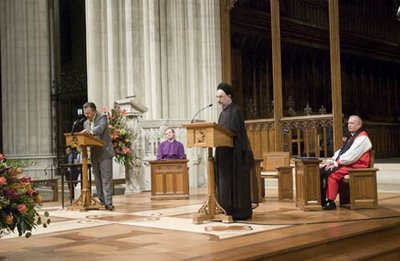 Some leading Episcopal bishops have sharply criticized the decision to invite former Iranian President Mohammed Khatami to speak at the Washington National Cathedral, the seat of the presiding bishop of the church's American branch. Image Credit: Donovan Marks
Some leading Episcopal bishops have sharply criticized the decision to invite former Iranian President Mohammed Khatami to speak at the Washington National Cathedral, the seat of the presiding bishop of the church's American branch. Image Credit: Donovan MarksEpiscopal Bishops: Speech Requires Rebuttal, Right?
There is dissention amongst the Episcopal Bishops, and this time it is not about whether females should become congregational leaders or same-sex marriage. The bishops are disturbed that past Iranian leader, Muhammad Khatami, has been invited to speak at Washington National Cathedral.
The issue that bothers the bishops the most is that past President Khatami will be speaking at the Cathedral with out any other speakers that might have a differing point of view than that of this "reformist" Iranian leader.
With all of the Point-Counterpoint discussions that have happened this year within the American "Province" of the global Anglican Communion, it seems that this point of order would actually carry the day. But, Noooooooo! The American Episcopal Church clearly has no interest in tradition when it comes to public discourse either.
Excerpts from The Episcopal News Service -
Khatami's visit to National Cathedral generates mixed reactions
By Matthew Davies - Wednesday, September 06, 2006 - Episcopal News Service
Iran's former president, Muhammad Khatami, has been invited to speak at Washington National Cathedral on September 7, a move that has stirred up strong protest from three Episcopal bishops, but one that is regarded by Cathedral officials as a gesture toward reconciliation.
The Rev. Canon John L. Peterson, director of the Cathedral's Center for Global Justice and Reconciliation, explained that "although former president Khatami is viewed negatively by some, he is important as the most moderate Iranian voice willing to discourse with Americans on matters of peace among the Abrahamic faiths."
Bishops John B. Lipscomb of Southwest Florida, Edward S. Little of Northern Indiana, and Geralyn Wolf of Rhode Island protested the scheduled speech in a September 5 statement, describing the event as "ill-conceived" and "inappropriate," and calling for its cancellation.
The statement claimed that Khatami's actions "do not support the goal of reconciliation for which our Church has so fervently prayed and worked" and noted that during his term in office, "women continued to be marginalized, and homosexual persons were executed."
The bishops also pointed out that Khatami has neither renounced Iran's nuclear ambitions nor "the virulent anti-Semitism of the current regime, known for its Holocaust denial and call for the destruction of the State of Israel."
----
The three bishops raised concerns that Khatami's presence at the Cathedral would further compromise relationships with the Jewish community, "and further reveal our shallow understanding of the complexities of the tragedy in the Middle East."
----
The bishops noted their appreciation of the Cathedral's "commitment to diversity and transformative conversation. However, without the inclusion of those with differing perspectives, this event is an inappropriate expression of that commitment, and does not further our ability as a Church to foster reconciliation in a divided world."
Felice D. Gaer, chair of the U.S. Commission on International Religious Freedom (USCIRF), an independent, bipartisan federal agency, wrote to Peterson, calling on the Cathedral to ensure that Khatami is questioned about his own record on human rights and religious freedom.
Gaer noted the irony of inviting Khatami to speak on the role of the Abrahamic faiths in the peace process when, in his own country, "Khatami presided as President while religious minorities -- including Jews, Christians, Sunni and Sufi Muslims, Baha'is, dissident Shia Muslims, and others -- faced systematic harassment, discrimination, imprisonment, torture, and even execution based on their religious beliefs."
Read All>>
The Episcopal Bishops have a point.
Lecture by Former Iranian President Mohammad Khatami
Thursday, September 7, 2006 – Full Text Here
Excerpt -
Here, I must call attention to the fact that there is a profound difference between my criticism of modernism and the perspective from which I make my argument, and that of modernity’s famous critiques in the West; particularly from a philosophical viewpoint. They see no discerning power in reason and consider it a mere weapon that destroys all including itself, and compare it to a rusty tool that is only suitable for a museum. It must be kept in mind that without acknowledging the discerning ability of reason, we cannot utilize it as a tool for criticism. This discussion regarding discernment, and particularly its relation to domination and power, is beyond the scope of our current discussion. It suffices to state that without the discerning power of reason, we cannot have a clear view of the most vital human concepts such as human rights, peace, justice and freedom, and therefore we cannot strive towards their implementation.
This is by no means an invitation to the European rationalism and logocentrism belonging to an era before post-modernism. The West, being the greatest victim of over- reliance on reason, is seeking the help of intellectuals and philosophers to deprive reason of every credit and privilege that was once bestowed upon it.
MAXINE SAYS ... PLEASE, REBUTT THIS!


No comments:
Post a Comment